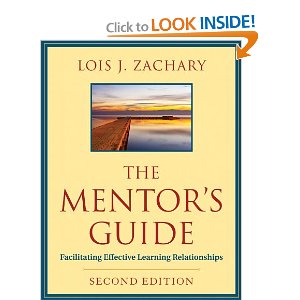 Lois Zachary does not only set out the basic principles and best practices of mentoring in The Mentor’s Guide, she actually goes a step further and helps readers discover their own personal mentoring style and preferences.
Lois Zachary does not only set out the basic principles and best practices of mentoring in The Mentor’s Guide, she actually goes a step further and helps readers discover their own personal mentoring style and preferences.
Through many exercises, she guides the reader through introspection and action. Thus, she not only conceptually ties mentoring to adult education, but she actually writes in a manner according to the principles of adult education.
Consequently, she challenges the prevailing myths of mentoring, and proposes a model of mentoring where both mentor and mentee are fully engaged and learning from one another. Her proposed model is one that is based on critical reflection and application, rather than knowledge transfer and acquisition (Location 300).
Mentoring is not just for the mentee, but it is a mutually beneficial relationship where both mentor and mentee will grow in knowledge, skills, and self-awareness.
For this type of mentoring to take place, both mentor and mentee need to be active participants in keeping one another accountable, even though the ownership of the learning needs and content have to be self-directed by the mentee. Ultimately, the focus is on the learner, the learning process, and the learning, rather than the mentor, organization, or any sort of goals (Loc 370).
Mentoring is a process where the mentor teaches the mentee that “everything that happens to you is your teacher. The secret is to learn to sit at the feet of your own life and be taught by it” (Location 767).
I give this book 5 out of 5.